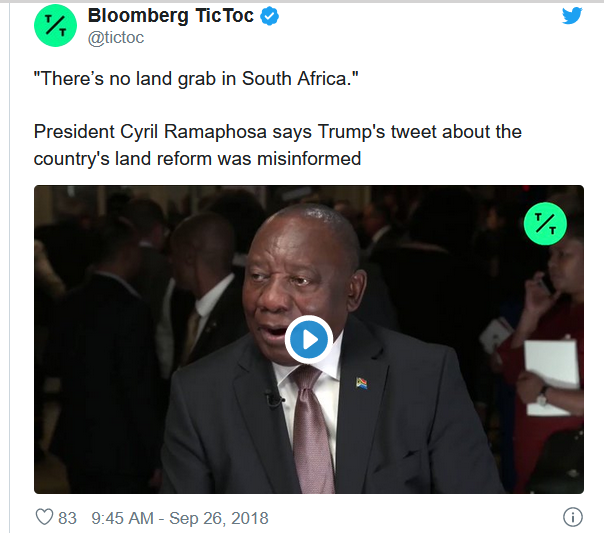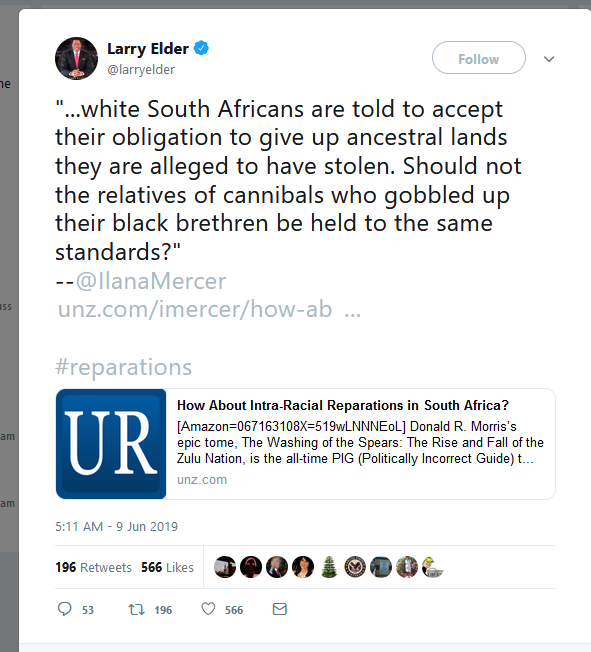NEW COLUMN IS “How About Intra-Racial Reparations In South Africa?” It’s on WND.COM and the Unz Review.
An excerpt:
Donald R. Morris’s epic tome, The Washing of the Spears: The Rise and Fall of the Zulu Nation, is the all-time PIG (Politically Incorrect Guide) to Zulu history.
In it, Morris notes correctly that the Bantu, like the Boers, were not indigenous to South Africa. They “dribbled south” from some “reservoir in the limitless north,” and, like the European settlers, used their military might to displace Hottentots, Bushmen (his archaic terminology), and one another through internecine warfare.
Indeed, there was bitter blood on Bantu lands well before the white settlers arrived in South Africa.
Westerners have committed the little San people of Southern Africa, the “Bushmen,” to folkloric memory for their unequalled tracking skills and for the delicate drawings with which they dotted the “rock outcroppings.”
The San were hunters, but they were also among the hunted. Mercilessly so. Alongside the Boers, Hottentots and blacks “hunted down Bushmen for sport well into the 19th Century.”
In “the book to end all books on the tragic confrontation between the assegai and the Gatling gun,” Morris places Cape Town’s founder and Dutch East India Company official J. A. Van Riebeeck, on landing at the Cape in 1652, 500 miles to the south and 1,000 miles to the west of the nearest Bantu. Joined by other Protestants from Europe, Dutch farmers, as we know, homesteaded the Cape Colony.
No doubt, the question of land ownership deeply concerned the 19th century trek Boers, as they prepared to decamp from the British-ruled Cape Colony and venture north. Accordingly, they sent out exploration parties tasked with negotiating the purchase of land from the black chieftains, who very often acted magnanimously, allowing Europeans to settle certain areas. Against trek Boers, it must be said that they were as rough as the natives and negotiated with as much finesse.
Still, the narrative about the pastoral, indigenous, semi-nomadic natives, dispossessed in the 17th century of their lands by another such people, only of a different color—this is as simplistic as it is sentimental.
When Boer and Bantu finally clashed on South Africa’s Great Fish River it was a clash of civilizations. “The Bantu viewed the land as entailed property that belonged to the clan. A chieftain might dispose of the right to live on the land, but he could not dispose of the land itself.” The European mind in general could not grasp the concept of collective ownership and “regarded a land transaction as a permanent exchange of real property.”
As Morris observes in his matter-of-fact way, “The Bantu view insured European encroachment and the European view insured future strife.”
South Africa has since reverted to “The Bantu view.” It is thus perhaps inevitable that 21st-century land claims or “restitution” in South Africa are not dominated by individual freehold owners reclaiming expropriated land, based on title deeds kept on record.
Rather, a group of blacks scheming on a particular property will band together as a “tribe,” and pool the taxpayer grants, which its members have received gratis, for the purpose of purchasing occupied land.
No sooner does this newly constituted “tribe” (or band of bandits, really) launch a claim with the South African Department of Rural Development and Land Reform, than related squatters—sometimes in the thousands—move to colonize the land. They defile its grounds and groundwater by using these as one vast latrine, and terrorize, even kill, its occupants and their animals in the hope of “nudging” them off the land.
The latest victim of this guerrilla warfare is a wine farmer, Stefan Smit of blessed memory, gunned down on his Stellenbosch estate, in the Western Cape. …
… READ THE REST. NEW COLUMN, “How About Intra-Racial Reparations In South Africa?“, is now on WND.COM and the Unz Review.


